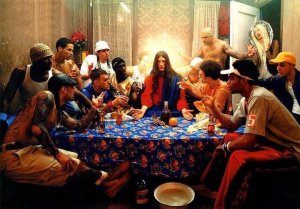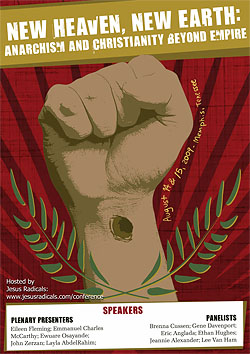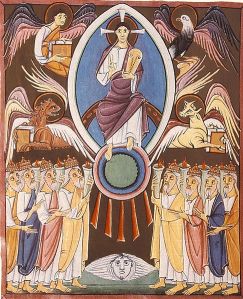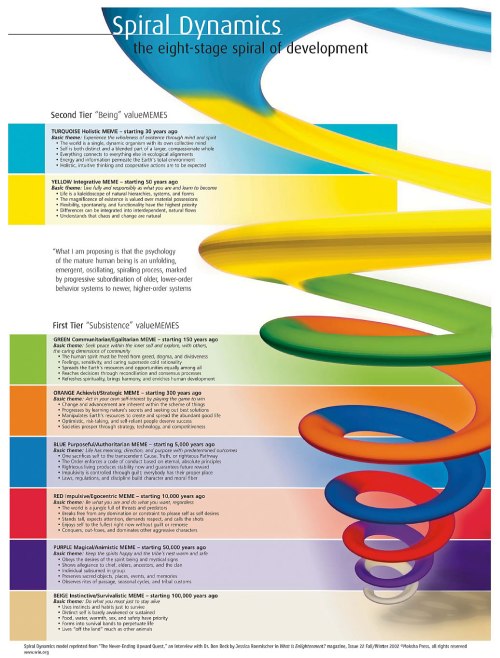 Happy June! In May I was able to chat with Len Sweet and Frank Viola, penners of the declaration-turned book Jesus Manifesto: Restoring the Supremacy and Sovereignty of Jesus Christ (not to be confused with the Anabaptist-anarchist Jesus Manifesto webzine edited by Mark Van Steenwyk – same great Jesus, two different manifestos.). It garnered a ton of signatures and acclaim last year when put online in short form – as well as a little controversy for its emphases and what it didn’t say. That’s why I wanted to interview these two gents, to set the record straight with the book’s release today.
Happy June! In May I was able to chat with Len Sweet and Frank Viola, penners of the declaration-turned book Jesus Manifesto: Restoring the Supremacy and Sovereignty of Jesus Christ (not to be confused with the Anabaptist-anarchist Jesus Manifesto webzine edited by Mark Van Steenwyk – same great Jesus, two different manifestos.). It garnered a ton of signatures and acclaim last year when put online in short form – as well as a little controversy for its emphases and what it didn’t say. That’s why I wanted to interview these two gents, to set the record straight with the book’s release today.
And so, without further ado..!
1. Jesus: He’s the central figure of our faith, and yet in so many ways He’s like a living Rorschach test – everyone sees what they want to see: Mystic, sage, redeemer, prophet, reformer. Who is your Jesus? Is He the Jesus of history? The Christ of faith and inner experience? What are your sources, and what need do you feel that Jesus Manifesto is fulfilling in publishing, yet again, about the Most Talked About Man in History?
Frank: We believe that the Jesus disclosed to us in the New Testament is the same Christ whom the Holy Spirit reveals today. He is the Christ of the cosmos, the Christ of Eternity, the Alpha and the Omega, as well as the Christ who lived on this earth as the quintessential human – the second Adam, or more accurately, the Last Adam – who then died, rose again, was glorified, ascended, enthroned, and now lives in His people.
By my lights, the Christ that is presented to us in Colossians and Ephesians is little known or preached today. Mind you, He’s the same Christ as the One born in Bethlehem. But His incomparable greatness has been lost sight of in so many quarters.
We feel that for many Christians today, their Christ is simply too small. And so we chase all sorts of other things . . . good things, religious things, spiritual things even. And Jesus becomes a mere footnote or a stamp of approval – an Imprimatur – that we place over those other things.
We expound on the following point in one of our chapters, but take for instance Paul’s letter to the Colossians. Scholars have spent a lot trying to figure out the exact nature of the erroneous teaching that captured the minds and hearts of the Colossian believers.
One of the reasons why there is so much debate over it is because Paul never directly addresses the problem. Paul’s primary way of dealing with church problems is to give God’s people a stunning unveiling of Jesus Christ. (Therein lies a valuable lesson for all church leaders.)
For Paul, Jesus Christ is the solution to all problems. And any problem that a believer or a church has can always be juiced down to one common denominator. They have lost sight of the Head, Christ. They have lost touch with the living Christ. Or to put it in Paul’s words, they have stopped “holding fast to the Head.”
But whatever the error was, we can be sure of this: The Colossians thought they could graduate beyond Jesus Christ. They took Him as Lord and Savior, but they felt they could advance to higher and deeper things. Higher and deeper things beyond Jesus . . . hmmm.
In short, if we ever get to the place where Jesus Christ isn’t enough … if we ever get to the place where we feel we can advance beyond Him … then we haven’t met the Christ of Colossians. And our Christ is too small.
In the same connection, there is a debate within much of Christendom presently. It’s not new, but it’s grabbed the attention of many young believers, so it seems novel to some.
One side argues for the Jesus of justice – who is largely derived from the Gospel accounts. The other side argues for the Jesus of justification – who is largely drawn from some of Paul’s statements in Galatians and Romans.
While Len and I embrace the Jesus of justice and the Jesus of justification, our book attempts to present a Christ who is far greater, far more glorious, and far richer than simply being the Justice-Giver or the Justifier.
We feel that this third vision of Jesus is sorely neglected in our time. It’s possible to put justice and justification on the throne, and leave the living Christ out in the cold.
The indwelling life of Jesus also seems to be a missing note in both discussions.
In this regard, I don’t think I can improve upon what Rowan Williams, Archbishop of Canterbury, said about the book:
“This is a really exhilarating reintroduction to a Jesus who seems sometimes to have become a stranger to the Church; a passionate and joyful celebration of God with us, which cuts right through churchy quarrelling and brings us back to wonder, love and praise – and the urgent desire to make Him known to all.”
 Len: When I was 17, I deconverted from Christianity and became an atheist. After college I decided to go into academe and study the history of religions from a scientific, critical perspective. When I was in graduate school, and gradually finding my way back to faith, I made an appointment with a professor to talk about my return journey to orthodoxy. This theologian confessed that for him personally, “I am in pursuit of truth. Whatever truth is, and wherever it is to be found, that is the journey I’m on. When I seek truth and find it, and if truth turns out to be two hydrogen atoms that accidentally collided, and no more than that, I will kneel in front of those two atoms and give them my worship and praise.”
Len: When I was 17, I deconverted from Christianity and became an atheist. After college I decided to go into academe and study the history of religions from a scientific, critical perspective. When I was in graduate school, and gradually finding my way back to faith, I made an appointment with a professor to talk about my return journey to orthodoxy. This theologian confessed that for him personally, “I am in pursuit of truth. Whatever truth is, and wherever it is to be found, that is the journey I’m on. When I seek truth and find it, and if truth turns out to be two hydrogen atoms that accidentally collided, and no more than that, I will kneel in front of those two atoms and give them my worship and praise.”
I shall never forget the power of his words which sought to embrace the meaning of meaninglessness.
At about the same time, I encountered a letter Dostoevsky wrote to Natalya Fonvizina, in which he admitted that he was a “child of unbelief and doubt” and would remain so “until my coffin is closed over me.” That got my attention. But then Dostoevsky went on to say more: in the letter he laid out his conviction that “nothing is more perfect than Christ . . . .” He then adds: “If someone succeeded in proving to me that Christ was outside the truth, and if, in reality, the truth was outside Christ, then I should prefer to remain with Christ than with the truth.”
It suddenly hit me that here were the two choices I was facing in my spiritual journey: the worship of a Big Bang, or the worship of a Savior, Redeemer, Sanctifier and Friend who sticks closer than a Big Brother (Proverbs 18:24). That was a decisive moment for my spiritual pilgrimage, and I immediately immersed myself in our sacred texts and traditions and learned from them that it is dangerous to separate three things that enliven and enfaith us: Jesus, Scriptures, Holy Spirit. The Holy Spirit brings Christ to life, and the Scriptures point us to Christ. Separate one from the other and you risk writing another chapter in the history of the waylaying and wrong-footing of the Christian story.
2. The Jesus Manifesto started out as an online declaration by you two; now it’s a book. How did this come together?
Len: I smelled Jesus all over Frank and wanted to know how he had kept his faith “fixed” on Christ. Frank and I met at a GFU event, and stayed in the same bed & breakfast. In the course of coming and going, we both commiserated about how, to hold on to tolerance, so many of us think we must let go of Christ and just hold on to God. So the Christian story becomes Unitarian, primarily about God, only peripherally about God’s Spirit. But Jesus no longer has the leading role . . . that belongs to God alone.
Then I mentioned to Frank that I could not get to Colossians 2 because I couldn’t get past Colossians 1, where it says that “the secret that has been kept hidden has now been revealed, and that secret is Christ in you, the hope of glory.” When I found out that Frank also was transfixed and transfigured by Colossians, we first talked of jointly writing a commentary on Colossians. But then we were led in this direction, and now no one knows the rest of the story …
 Frank: In August of 2008, Len and I began conversing via email and phone. One of the things that came up in our conversations (as a pleasant surprise to both of us) was that we both felt that Jesus was getting short-changed in His church, being eclipsed by other “hot” topics and subjects.
Frank: In August of 2008, Len and I began conversing via email and phone. One of the things that came up in our conversations (as a pleasant surprise to both of us) was that we both felt that Jesus was getting short-changed in His church, being eclipsed by other “hot” topics and subjects.
In February 2009, we both spoke at a seminar hosted by George Fox Seminary, and we were able to spend some time in person to discuss what was on our hearts. Our burden only increased, as well as an awareness that God had something for us to accomplish together to discharge it.
In April, the idea of writing a joint article/essay emerged. We wrote it in approxiamately18 days, titled it “A Magna Carta,” and subtitled it “A Jesus Manifesto.” It was published online on June 22, 2009. It went viral immediately. I’m told that it was viewed 500,000 times in 8 weeks.
Thomas Nelson was interested in turning the essay into a book (and we were as well), and that’s what happened.
Folks can visit www.theJesusManifesto.com and read sample chapters, hear some brand new songs that were recorded by professional Christian artists based on the book (one of them by the man who wrote some of Amy Grant’s most popular tunes), check out the iPhone app, read endorsements, etc.
3. Frank, you’ve been identified with the ‘house church’ and ‘organic church’ movements – how has Jesus Manifesto been nurtured in that soil? In what ways do you think if functions as a kind of prophetic critique to it?
Frank: In 2005, I began working on a project that I finished at the end of 2009. The project has come to be called the ReChurch Library – five books on radical church reform and the restoration of God’s grand mission in the earth.
The dominating subtext of these five books is the absolute, functional headship and supremacy of the Lord Jesus Christ. Each book in the series themes around this subtext. The afterword of From Eternity to Here is fully dedicated to it.
In short, the organic expression of the church and the supremacy of Christ go hand in hand. Christ is the head; the church is His body. They are organically connected by life. I’ve defined the (local) church as a group of people who are learning to live by the indwelling life of Christ together and displaying that life in their locale. I don’t believe the New Testament knows of any other kind of local church. In addition, the church has no other specialty but her Lord. Everything else flows out of that relationship. Thus for me, the issue of the church has never been its structure. The issue has always been its center – Christ. If Christ is truly the functional head in a particular church, the expression of that church will be effected—sometimes radically. This is my chief argument in Reimagining Church.
Jesus Manifesto takes the thread Christ’s supremacy and builds an entire volume around it. Consequently, the book is a blending of both our (Len and mine) hearts, voices, and burdens regarding our shared vision that Christ should “have the first place in all things” (as Paul put it). Our book explores what that means exactly.
In short, I view Jesus Manifesto as an enlargement of the thread that runs through all of my previous books.
On a lighter note, for the last two years I’ve been writing cook books, but this is my first sweet book 😉
With respect to your last question, I am of the opinion that the driving force of much of the house church, organic church, simple church, and missional church movements is not Jesus Christ. And so I’d like to see this changed. Hopefully, God will use the book toward that end.
4. Len, you have been a pioneer in Christians’ being responsive to the postmodern cultural and philosophical turn – what is now known in different circles as ’emerging’ or ‘missional’ church. Is Jesus Manifesto a departure from your earlier fascination with cultural change and its impact on faith, or in some ways a fulfillment of it?
Len: Even though my primary field is history and semiotics, I challenge you to find one of my books where I do not make the case for the supremacy and sovereignty of Christ in some fashion. In fact, for the last decade, in one book after another, most blatantly in So Beautiful (2009) and Out of the Question, Into the Mystery (2004), I’ve been obsessed with making this case for understanding Jesus as “The Truth” and for understanding discipleship as becoming a Jesus manifest. I am only saying here what I have said in other places and other forms and other ways: how do we speak the name of “Jesus” in such a way that the world we’re in can actually hear us, not the world we wish we had but the world we actually have. The difference is that here, I feel like Robin Williams in “Dead Poets Society,” where he has the students throw away and tear up the text books and instead stand on top of the desks and speak at the top of their lungs. In Jesus Manifesto, maybe I’m back to my “shouting Methodist” and holiness Pentecostal roots.
5. Up until last year, I would have never expected Sweet and Viola to be sharing a book byline together! What was it like collaborating for this? Did your styles naturally gel, or was co-authoring difficult?
Frank: We were given a very quick deadline from the publisher after the book idea was finalized. As a result, we wrote the entire book in roughly six weeks. We were laboring on it Christmas Day even, rushing to meet our January 1st deadline. The book was also bathed in prayer. We deliberately prayed for one another as we wrote our chapters.
But despite the haste, the process went smoother than I expected. We complimented each other’s chapters, adding to them our own unique ingredients and seasoning them with our own peculiar spices. Len made my chapters stronger, and I hope I did the same for his. I trust that readers will feel that the mix works.
Len: For me, what Frank and I did was not “work” but “play.” You don’t “work” a violin. You don’t “work” basketball. You play a violin; you play basketball. All the best creativity comes from a play paradigm, not a work paradigm. “Labor” was what we got when we were banished from the garden, and in writing this book I felt that I was back in the garden, living out of God’s Prime Directive to Adam (“Conserve and Conceive”), with my pen a plow and my keyboard a seedbed.
I always feared that co-authoring a book would stymie rather than stimulate my creativity. When I tried my hand at woodworking, I never could master the art of mortise and tenon joinery. But I found that Frank’s passionate investment in the project opened the sluices of my soul and the rain that flowed out from both our beings is what you hold in your hand. It’s a fine line between drawing out a colleague’s best and dredging. Frank never crossed the line. It was a joy to play with him in making mudpies of praise out of soil and rain. But as Frank says, the reader is the ultimate judge and jury of our Back to the Garden project.
6. You all were up against some pretty strong critiques toward your original online Jesus Manifesto last year. Some folks thought that you were so ‘Christ-centered’ that you weren’t Trinitarian enough; others thought you magnified Jesus’ person at the expense of His teachings and deeds. Reading the book length Jesus Manifesto, I see that you more than address Jesus’ place in the Triune dance; perichoresis, the community life of God. But what would you say to the readers approaching your book who are looking to integrate this high view of Jesus with their desire to pursue a witness of good works and social justice toward expressing God’s Kingdom?
Len: Actually, we spend a lot of time talking about this in the book, maybe too much time (two chapters is a lot). But we did it because justice is now top dog among social values, and for many in both the more liberal and emerging sectors of the church, justice is another word for “equality”—making more equality more just than less equality.
The truth is no one knows what justice is. No philosopher in history has been able to satisfactorily define justice, whereas everyone knows what injustice is. Injustice is subject to Justice Potter Stewart’s “you-know-it-when-you-see-it” test (first applied to pornography). In fact, one of the best definitions of justice may be this: justice is what emerges in the struggle against injustice. If you don’t believe me, read Amartya Sen’s new book, The Idea of Justice (Harvard University Press, 2009), where he argues that justice is not a philosophical category or principle (“niti”) but a practice (“nyaya”). Justice is a practical matter of dealing with injustice; justice is asking “what is best to do in the here and now, given what can be done.”
In other words, even philosophers are bringing us back to Micah 6:8 where we are to “love mercy,” and “do justice” all the while “walking humbly with our God.” Notice what we’re to love: mercy. We’re to “do justice,” or to “practice justice,” but we are to “love mercy” and “walk humbly.”
My critique of the emerging movement is precisely here: it’s like these “young evangelicals” discovered the “social gospel” movement a century after liberals did, or fifty years after their boomer parents did in “Sojourners.” I’m a “social gospel” person (is there any other gospel than a social one?). But when you replace the “kingdom of justice” as the “framing story” rather than Jesus’ life, death and resurrection as the framing story, there ends up everything “social” and nothing “gospel.” In the Scriptures the kingdom is never something you build or create; the kingdom is something you receive as a gift and enter with your whole being, because the kingdom is the presence of Christ. A couple of years ago Relevant magazine interviewed me about my critique of Emergent and the emerging church along these precise lines, so you can read more about it there.
Frank: Someone once counted almost 200 blogs on the original essay. As I recall, there were only five that were negative. The ones I saw did mention that we neglected to discuss the Trinity—a correct observation. The others felt that we were somehow pitting Jesus against justice.
We certainly failed to talk about the Trinity in the essay. Right or wrong, we didn’t feel it was necessary to discuss it because our entire focus was on Jesus, and we were attempting to point out those aspects about Him that we felt aren’t getting enough air-play today. The Trinitarian nature of God wasn’t one of them; hence, it didn’t come up in our radar. We also wrongly assumed that most of our readers were familiar with our other books that go into the Trinity in detail.
On the other point, we tried to state as clearly as possible that it’s a gross mistake to separate the Jesus of the Gospels from the Person of Christ depicted in the epistles. And that it’s a profound failure to separate His Person from His teachings. For us, neither should be neglected; both should be held together. I addressed this very question (as well as the topic of God’s kingdom and liberation theology) more fully in an interview last year.
Having more space to unravel our vision and burden in the book (which is roughly 190 pages of actual text), we discuss the Trinity and we explore why the Person of Jesus shouldn’t be separated from His teachings and the problems that (we believe) ensue when we divide the two.
7. There seems to be a lot of grassroots energy behind this book, as well as some high-profile friends of its message via endorsers from across the Christian spectrum. If your fondest dreams could be actualized, what do you hope Jesus Manifesto will accomplish – on the literary landscape, in the Body of Christ, in the marketplace of ideas?
Len: When the Marx brothers were in the early stages of their career, the New York City family home was heavily mortgaged to the “Greenbaum” banking firm. Often the payments were very hard to come by. When the three elder brothers (Chico, Harpo and Groucho) and two younger brothers (Gummo and Zeppo) were on stage, their mother would stand in the wings. When her five zany sons began to improvise too much (especially Groucho) and depart from script, she would snap them back with a loud stage whisper: “Greenbaum! Remember Greenbaum!”
With this book Frank and I are hoping to snap the church back with a loud whisper: “Remember Christ. Remember Christ. Remember Christ.” It’s okay to improvise as long as you stay on script/Scripture and don’t short-shrift Christ. Don’t ever forget the supremacy and sovereignty of Christ.
One more thing: Christianity has lost its liturgical and devotional language. To be sure, English is not the best language for liturgy or piety, as it has largely lost its stately, magisterial register that makes the 1611 King James Version (which was mostly cribbed from Tyndale’s 1537 translation) so resonant and thrilling. Frank and I purposely wrote this in a worshipful way in an attempt to re-introduce the church to a devotional way of talking about Jesus that seems to be missing in the life of faith today.
Frank: Yes. We are thankful that we have over 20 endorsements from some of the most influential leaders on the Christian landscape today. They include Baptist, Reformed, Anglican, Methodist, Charismatic, Pentecostal, New Monastic, Neo-Anabaptist, Missional, etc. It’s a nice mix of theologians, biblical scholars, pastors, and renowned authors, all of whom share our passion for the supremacy of Christ.
My dream in a nutshell: That the Spirit of God would taken the unveiling of Jesus that’s presented in the book and press it upon the hearts of every reader, bringing us all to our faces in the presence of so great a Christ. That we would make Christ and Christ alone our chief pursuit, our chief love, our chief passion, and our chief obsession in life, in ministry, and in our churches – at whatever cost it may exact. That the body of Christ would begin to learn how to live by His indwelling life, which (according to the New Testament) is a major part of “the mystery of the ages.” And that churches all over this planet would be built upon the only foundation that exists – the Lord Jesus Christ Himself. Not in rhetoric, but in reality, thus discovering and displaying His inexhaustible riches to one another, to principalities and powers, and to a lost world.
All told: I see the body of Christ in battle with its own. Some are fighting on the left; others on the right. This is true politically as well as theologically. May these timeless words from our Father stop us all dead in our tracks:
“This is my beloved Son, hear HIM.”
Jesus Manifesto is our frail attempt to reflect this heavenly voice.
—
Jesus Manifesto: Restoring the Supremacy and Sovereignty of Jesus Christ (Thomas Nelson) releases Tuesday, June 1st (today!). Check it out and be re-centered.
 I’ve mentioned previously my admiration for what Bruce Sanguin is attempting with a genuinely tradition-honoring yet scientifically-sensitive approach to Christian spirituality. So imagine my delight in a recent reading of If Darwin Prayed when I discover this poem – a feast for those who hunger after Jesus in all his subversive fullness. Enjoy!
I’ve mentioned previously my admiration for what Bruce Sanguin is attempting with a genuinely tradition-honoring yet scientifically-sensitive approach to Christian spirituality. So imagine my delight in a recent reading of If Darwin Prayed when I discover this poem – a feast for those who hunger after Jesus in all his subversive fullness. Enjoy!

























Recent Comments